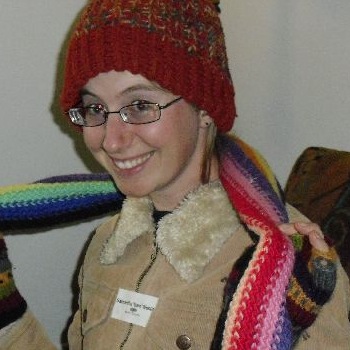 Those who don’t feel this Love pulling them like a river, those who don’t drink dawn like a cup of springwater or take in sunset like supper, those who don’t want change, let them sleep. This Love is beyond the study of theology… I’ve given up on my brain I’ve torn the cloth to shreds and thrown it away -Rumi The comments to our first post were both confirming and challenging, and we will continue tailoring this series based on people’s responses. One question that emerged last time was, how does wildness include accountability in relationship? There is a growing trend in Christian moral theology to discern systems of sexual ethics that are less act-based and more relationship-based. The growing consensus among progressive Christians is that the substance or content of a sexual relationship (ex. consent, mutuality) is more important than its form (ex. gender, marital status). (For a good example of this, see Just Love by Margaret Farley of Yale Divinity School.) Theologians are also questioning secular liberalism’s respect for individual freedom held against the Christian norm of community. (Ex. Sex, Gender, and Christian Ethics by Lisa Sowle Cahill of Boston College.) Before proposing a new framework of sexual accountability of our own, we need to tease out what individualism and community look like from a specifically ecological Christian perspective. When living in Bolivia, a Quechua woman explained to me (Liza) the difference between Andean epistemology and Western/Eurocentric epistemology. She said: for the Westerner, 1+1+1+1=4; for the Andean, 1+1+1+1=1. What she was getting at is the radical relationality of all living things that is represented in Andean philosophy versus the notion of individualism that the West (mostly the U.S and Europe) invented and ran with. The idea that we are each individuals, with full sovereignty over the choices we make for ourselves and total responsibility for the consequences of our actions, shapes life in the West. Indeed, the binaries that we discussed in the previous article in this series are predicated on the idea that people are isolated individuals who can be essentialized into one single element (woman, straight, Native, queer, Black, etc), abstracted out of their social or environmental context and labeled, valued, devalued, organized, categorized, and separated, like so many products. Any time we give a simple definition to something wild and natural, whether a person or sexuality itself, in an attempt to “know” it, we deny its complexity and contextuality and use it for our own purposes. So our first task is to problematize Western individualism. For this we can turn to the Body of Christ, and to our own bodies. Feminist scientist Donna Haraway points out how individualism is a myth even at the bodily level; she says, “I love the fact that human genomes can be found in only about 10 percent of the cells that occupy the space I call my body; the other 90 percent of the cells are filled with the genomes of bacteria, fungi, protists, and such, some of which play in symphony necessary to my being alive at all, and some of which are hitching a ride and doing the rest of me, of us, no harm. I am vastly outnumbered by my tiny companions…To be one is always to become with many.” Our very body, like the Body of Christ, is a community, and a multigendered, interspecies community at that. St. Paul’s metaphor of the Church as a body, combined with our ecological understanding of the body, points to the character of the community that Jesus envisioned and loved: wildly diverse including multiple ages, genders, sexualities, and species. Along with every other living thing, we are embodied and relational beings and these aspects of our humanity can find expression in the fact that God made us sexual. Given this, we must ask, how do we exist as healthy, fully alive and present community members, members of our own body as well as our own environmental and social/spiritual communities? We have to heal our ingrained abuse and disdain toward human sexual embodiment because how we treat our bodies affects how we treat all other bodies, and the body of the world. This requires undoing not just Western individualism but the collective Western project or communal ethic of body-hatred and control, which is rooted in U.S settler colonialism (as we discussed in our last article) and gives rise to many collective, body-based oppressions (racism, sexism, ableism, etc.). So we are not just advocating for a “communal” (as opposed to individualistic) ethic but for a particular communal ethic. Pennsylvania Senator Rick Santorum is a pro-Religious Right politician and no doubt an individualistic American. But note the deeply collective death-dealing agenda that’s behind his promotion of patriarchy for individual American families, from an interview with Fox News in 2003: “…it’s common sense that a marriage is between a man and a woman. I mean, every civilization in the history of man has recognized a unique bond. Why?… [It] is not about affirming somebody’s love for somebody else. It’s about uniting together to be open to children to further civilization in our society.” (By children he means white, Christian, American children, by the way.) Andrea Smith, a Native feminist scholar, reminds us that this patriarchal family structure of paterfamilias was viewed as the building block of empire from Roman through American settler colonial times (see her quotation in the end notes). We recognize that the dominant systems that are in place—capitalism, nationalism, imperialism, and the heterosexism that goes with them—are, by their nature collective systems, which promote individualism. Our quest for wildness therefore includes anti-individualist AND anti-oppressive practices: consent, accountability, humility, reciprocity, inter-dependency, confession and forgiveness. We need new ways of knowing one another, and luckily, a commitment to honoring and exploring sexuality provides many new ways of both loving AND knowing. A recent article on the Infoshop website, “Theoretical Polyamory: Some Thoughts on Loving, Thinking, and Queering Anarchism” by Deric Shannon and Abbey Volcano, ask if we can connect how we love with how we know. They posed the question this way: “How might we live our lives in ways that create new cultural forms and subjectivities that we build on our own terms (inasmuch as that is possible) rather than accepting the identities, cultures, and subjectivities that we have inherited from a sick and hierarchical world in which humanity is perpetually at war with itself, the environment, and the entire non-human world?” From the double-entendre of the Biblical “to know,” to the feminist movement’s insistence on taking embodied experience into account as valid knowledge, sexuality and epistemology (how we know what we know) can go hand in hand. For example, eco-theologian Sallie McFague advocates for an ethic of interconnectedness that acknowledges difference, rather than seeking a state of pseudo-oneness, by embracing our sensuality as an alternative way of knowing. She points out that “touch,” our main embodied way of experiencing life, is also a metaphor for a respectful way of experiencing, knowing, and learning about other people and beings (including God) in our world. We can touch an “other” like God in and through the details of creation, with this connection simultaneously highlighting the distinctness of the other body. Touch is just one aspect of our senses, our multiple ways of connecting. Our senses both limit and enhance connection; in sensing something or someone else, you literally become part of that thing/creature, while knowing simultaneously that you are not that thing/creature. For example, Diane Ackerman in A Natural History of the Senses writes about how when you smell someone, you are inhaling particles of their skin and hair, literally breathing them in; yet, you are still not that person. Interconnectedness and difference. With an ecological understanding of community, we can now reframe our question of how wildness includes accountability in relationship. Sex-positive norms, including “wild” ones, must arise from communities out of their own histories, which have differential experiences of positive sexual affirmation, respect, and freedom, and negative sexual denigration and violence. Shannon and Volcano urge “anyone who identifies with queer positionality (such as the authors of this series) to take steps to ensure that new categories and identities that we develop in response to what currently exists do not become new normative standards within our own communities.” White sex-positive feminists (such as the authors) cannot and should not speak for everyone in defining sex-positivity for communities and movements. This pattern has been problematic in promoting normative ethics and prescriptive standards, which map onto reality, rather than allowing living beings to exist for their own purposes and to listen to their own experience as a guide. However, we also recognize that the answer within communities and organizations is neither to let social dynamics play out completely unchallenged, accepting whatever behavior patterns arise. Most often, when communities or organizations have no structure of accountability built in, even in the name of having a free or anarchistic space, we have seen that this results in the reenactment of dominant societal norms like white leadership, male leadership, cis-gender leadership, straight leadership, able-bodied leadership, and the dismissal of the experiences and opinions of people who are not these. We are wary of the idea of prescribing behavior (for ourselves or others), yet see the efficacy of a system in place that enables certain behavior patterns and protects against others. So, what would an accountable, anti-oppressive collective project around sexuality look like in your community? What does “sex-positivity” mean to you and yours? Blessing of the Senses by Fr. John O’Donahue May your body be blessed. May you realize that your body is a faithful and beautiful friend of your soul. And may you be peaceful and joyful and recognize that your senses are sacred thresholds. May you realize that holiness is mindful gazing, feeling, hearing , and touching. May your senses gather you and bring you home. May your senses always enable you to celebrate the universe and the mystery and possibilities in your presence here. May the Eros of the Earth bless you. End Notes Donna Harraway When Species Meet (University of Minnesota Press 2007) Indigenous feminist scholar of decolonization Andrea Smith writes in GLQ Journal: “Heteropatriarchy is the logic that makes social hierarchy seem natural. Just as the patriarchs rule the family, the elites of the nation-state rule their citizens. Consequently, when colonists first came to the Americas, they saw the necessity of instilling patriarchy in Native communities because they realized that indigenous peoples would not accept colonial domination if their own indigenous societies were not structured on the basis of social hierarchy. Patriarchy, in turn, rests on a gender-binary system; hence it is not a coincidence that colonizers also targeted indigenous peoples who did not fit within this binary model. In addition, gender violence is a primary tool of colonialism and white supremacy. Colonizers did not just kill off indigenous peoples in this land, but Native massacres were always accompanied by sexual mutilation and rape. As I have argued elsewhere, the goal of colonialism is not just to kill colonized peoples but to destroy their sense of being people. It is through sexual violence that a colonizing group attempts to render a colonized peoples inherently rapable, their lands inherently invadable, and their resources inherently extractable.”
Comments
|
Disclaimer
The viewpoints expressed in each reader-submitted article are the authors own, and not an “official Jesus Radicals” position. For more on our editorial policies, visit our submissions page. If you want to contact an author or you have questions, suggestions, or concerns, please contact us. CategoriesAll Accountability Advent Anarchism Animal Liberation Anthropocentrism Appropriation Biblical Exegesis Book Reviews Bread Capitalism Catholic Worker Christmas Civilization Community Complicity Confessing Cultural Hegemony Decolonization Direct Action Easter Economics Feminism Heteropatriarchy Immigration Imperialism Intersectionality Jesus Justice Lent Liberation Theology Love Mutual Liberation Nation-state Nonviolence Occupy Othering Pacifisim Peace Pedagogies Of Liberation Police Privilege Property Queer Racism Resistance Resurrection Sexuality Solidarity Speciesism Spiritual Practices Technology Temptation Veganism Violence War What We're Reading On . . . White Supremacy Zionism ContributorsNekeisha Alayna Alexis
Amaryah Armstrong Autumn Brown HH Brownsmith Jarrod Cochran Chelsea Collonge Keith Hebden Ric Hudgens Liza Minno Bloom Jocelyn Perry Eda Ruhiye Uca Joanna Shenk Nichola Torbett Mark VanSteenwyk Gregory Williams Archives
October 2017
|
Search by typing & pressing enter



 RSS Feed
RSS Feed